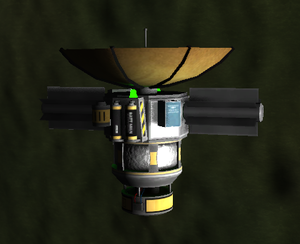Difference between revisions of "Probe"
(+Usage section; expanded some prior content.) |
(+icon, +info) |
||
| Line 1: | Line 1: | ||
{{stub}} | {{stub}} | ||
| + | [[File:IconProbe.png|left|link=]][[File:IPSP orbit.png|thumb|A probe in an orbit around [[Kerbin]]]] | ||
| + | '''Probes''' are [[craft]] whose [[command module]]s have zero crew capacity, modules generally known as “probe cores”. The probes can do experiences, and can reach those places what the kerbaled vessels cannot, or not able to return from ''(at same cost or tech level)''. | ||
| − | + | Craft controlled by probe cores that include crewed modules lacking command capability (the [[PPD-10 Hitchhiker Storage Container]] or the [[Mobile Processing Lab MPL-LG-2]]) are automatically typed by KSP as probes, although players may consider them some other [[Craft#Vessel types|type]] of craft. Likewise, players may consider particularly large probes or probes resembling conventional [[plane]]s, [[rocket]]s, or [[rover]]s as belonging to other types or categories. | |
| − | |||
== Usage == | == Usage == | ||
Probes can be used for any type of craft and thus for any purpose. However, crewed command modules include [[Science]] opportunities for [[Science#Crew Report|Crew Reports]], [[Science#EVA Report|EVA Reports]], and, while landed, [[Science#Surface Sample|Surface Samples]]. [[Kerbonaut]]s can also repair landing legs, wheels, and repack any parachutes, while probes cannot. | Probes can be used for any type of craft and thus for any purpose. However, crewed command modules include [[Science]] opportunities for [[Science#Crew Report|Crew Reports]], [[Science#EVA Report|EVA Reports]], and, while landed, [[Science#Surface Sample|Surface Samples]]. [[Kerbonaut]]s can also repair landing legs, wheels, and repack any parachutes, while probes cannot. | ||
| − | Even though probe cores constantly consume [[electricity]] and thus usually need more batteries and energy-sources than manned command pods, the mass of a probe is much lower than that of a manned vessel with comparable abilities in most cases. A lower payload mass means that less fuel is required to bring it to its destination, which also means destinations further away are far more feasible for probes than manned vehicles. Critically, lowering payload mass means exponentially less initial mass on launch within the atmosphere. | + | Even though probe cores constantly consume [[electricity]] and thus usually need more [[battery|batteries]] and energy-sources than manned command pods, the mass of a probe is much lower than that of a manned vessel with comparable abilities in most cases. The probe cores become unguidable if lack of energy, so have to plan the probes electric capacity well. For an orbiting prob worth to check the batteries for the [[orbit darkness time]] of the orbited body. A lower payload mass means that less fuel is required to bring it to its destination, which also means destinations further away are far more feasible for probes than manned vehicles. Critically, lowering payload mass means exponentially less initial mass on launch within the atmosphere. Due to their lower mass they can use the more efficient [[ion engine]]s more comfortably. As they doesn't carry any kerbals they can be used one-way missions too, further increasing their range. |
Also, some players have ethical issues with abandoning Kerbals while they do not worry about abandoning an unmanned probe. Not requiring the fuel for the return trip further increases the range of the vessel. | Also, some players have ethical issues with abandoning Kerbals while they do not worry about abandoning an unmanned probe. Not requiring the fuel for the return trip further increases the range of the vessel. | ||
[[Category:Craft]] | [[Category:Craft]] | ||
Revision as of 14:16, 17 February 2015

Probes are craft whose command modules have zero crew capacity, modules generally known as “probe cores”. The probes can do experiences, and can reach those places what the kerbaled vessels cannot, or not able to return from (at same cost or tech level).
Craft controlled by probe cores that include crewed modules lacking command capability (the PPD-10 Hitchhiker Storage Container or the Mobile Processing Lab MPL-LG-2) are automatically typed by KSP as probes, although players may consider them some other type of craft. Likewise, players may consider particularly large probes or probes resembling conventional planes, rockets, or rovers as belonging to other types or categories.
Usage
Probes can be used for any type of craft and thus for any purpose. However, crewed command modules include Science opportunities for Crew Reports, EVA Reports, and, while landed, Surface Samples. Kerbonauts can also repair landing legs, wheels, and repack any parachutes, while probes cannot.
Even though probe cores constantly consume electricity and thus usually need more batteries and energy-sources than manned command pods, the mass of a probe is much lower than that of a manned vessel with comparable abilities in most cases. The probe cores become unguidable if lack of energy, so have to plan the probes electric capacity well. For an orbiting prob worth to check the batteries for the orbit darkness time of the orbited body. A lower payload mass means that less fuel is required to bring it to its destination, which also means destinations further away are far more feasible for probes than manned vehicles. Critically, lowering payload mass means exponentially less initial mass on launch within the atmosphere. Due to their lower mass they can use the more efficient ion engines more comfortably. As they doesn't carry any kerbals they can be used one-way missions too, further increasing their range.
Also, some players have ethical issues with abandoning Kerbals while they do not worry about abandoning an unmanned probe. Not requiring the fuel for the return trip further increases the range of the vessel.